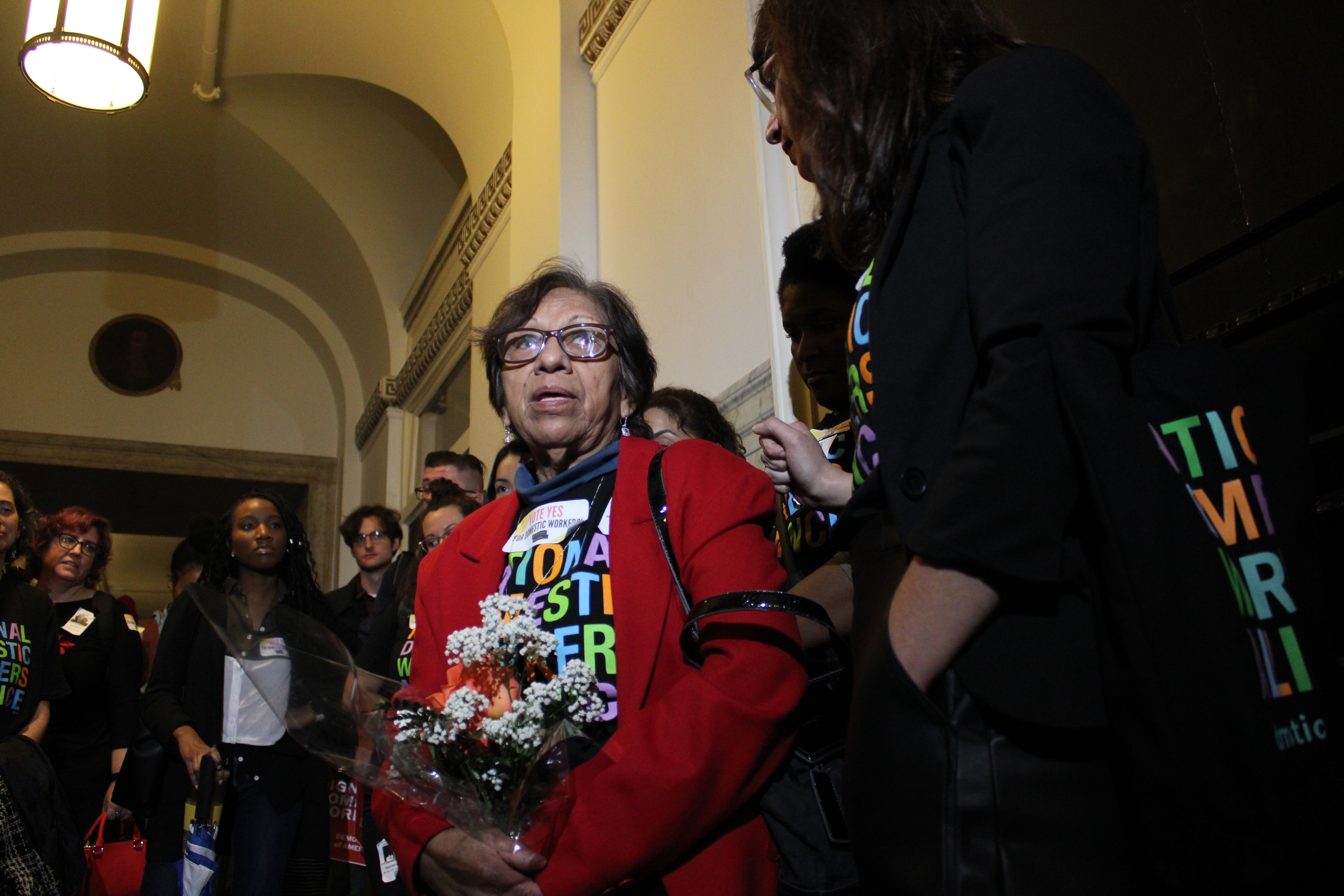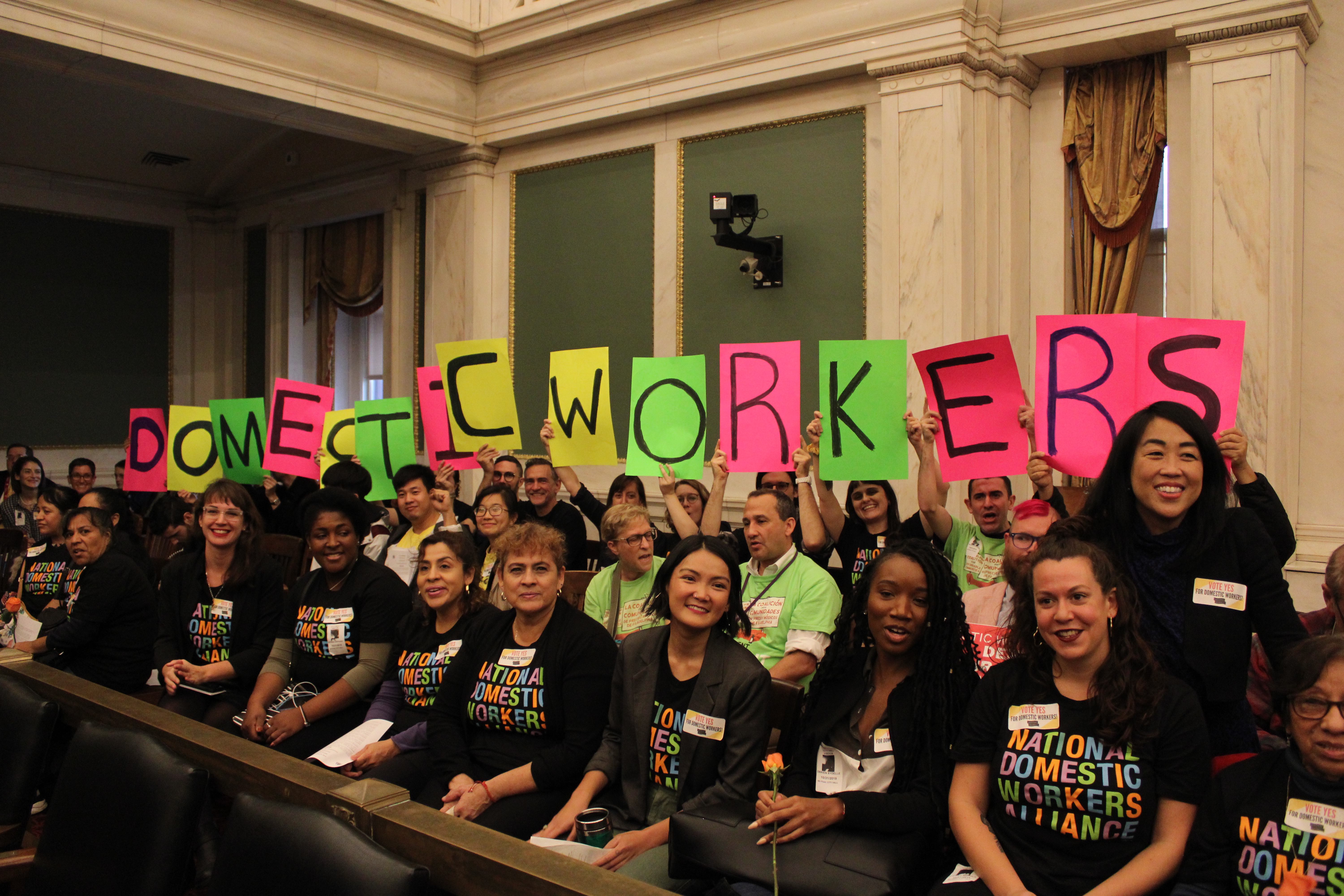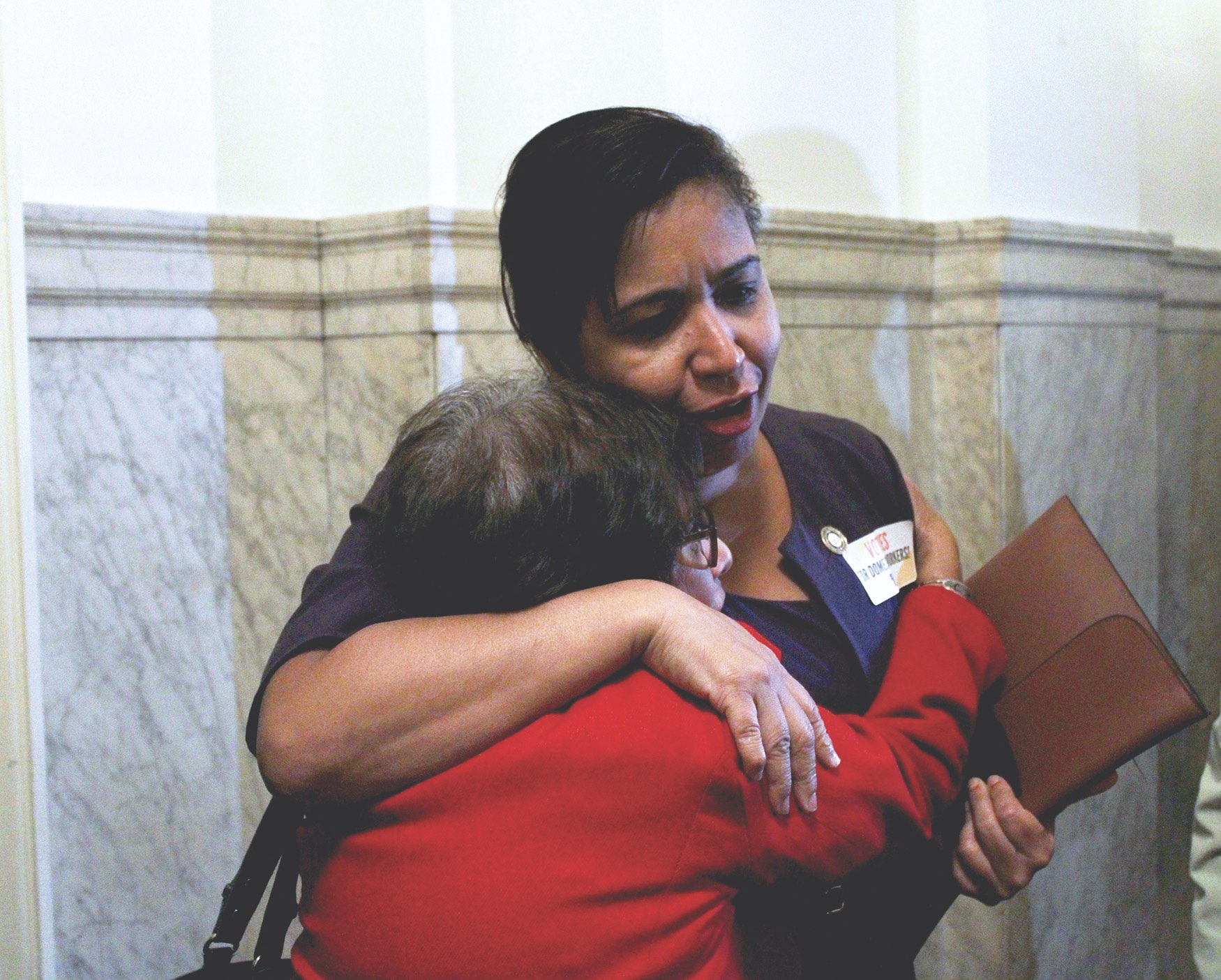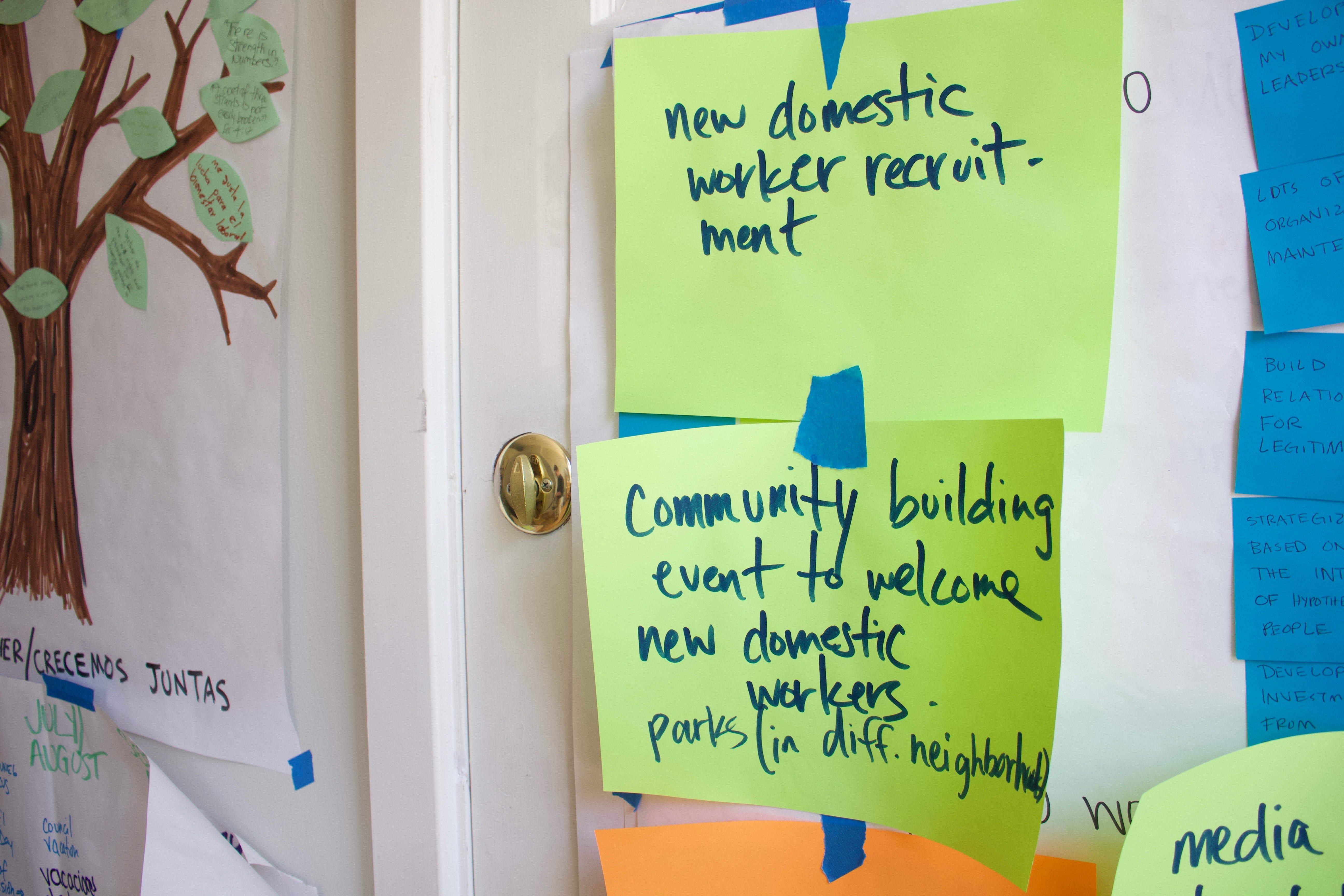
What comes next for Philadelphia’s domestic workers?
A key factor in the enforcement of the Domestic Workers Bill of Rights will be ensuring that all workers, including those who are undocumented, are confident…
For Lucy, Betania Shephard, and Mercedes, some of the most important people weren’t in the room as the Domestic Workers Bill of Rights was passed by Philadelphia City Council on Oct. 31.
As part of the Pennsylvania Domestic Workers Alliance (PDWA), the three domestic workers fought alongside City Councilwoman María Quiñones-Sánchez and other city councilmembers to pass protections for the more than 16,000 nannies, housekeepers, and caretakers in Philadelphia.
After Mayor Jim Kenney signed the bill into law on Nov. 26, Philadelphia joined nine states and the city of Seattle in passing labor protections for domestic workers. The Philadelphia legislation, which will take effect in May 2020, has been noted by many to be the strongest in the nation.
The bill includes: anti-discrimination laws, mandatory written agreements, mandatory meal and rest breaks, the creation of a nine-person board to monitor standards and implementation, and the establishment of a portable paid time off system (which could reform what workers’ rights look like for many in the gig economy).
However, the three women all stated on the historic day that the moment of celebration was shared not only among those who had come forward with stories of discrimination in the struggle to push for legislation, but also those that still fear coming forward.
“I’m very happy because this represents a lot for us and for many more...those who aren’t here but are experiencing the same things, or worse,” said Shephard, outside of the City Hall chambers.

Mercedes, who has been a domestic worker in Philadelphia for the past 31 years, felt she hadn’t experienced as much discrimination as some, but wanted to fight for greater protection on behalf of the many other domestic workers she knows who have suffered workplace abuse. Due to fear of reprisals related to their immigration status, many have been unwilling to come forward to either denounce those abuses or speak out in favor of the bill of rights.
According to a 2012 study from the National Domestic Workers Alliance, approximately 36% of domestic workers in the U.S. are undocumented; that percentage grows to 57% or more in Texas or other areas with higher concentrations of immigrant communities. Ensuring that undocumented workers have safe and secure access to law enforcement is just one challenge in regulating workers’ rights in an industry that has historically been ignored by labor protections, but is now one of the fastest-growing industries in the U.S.
But organizers, domestic workers, and city leaders say that Philadelphia’s bill and implementation could ultimately serve as a road map for how to effectively regulate an industry in which it is necessary to have full participation and the trust of undocumented workers.
Shephard and other domestic workers who are part of the PDWA hope that now that the bill is set to take effect in May 2020, there will be more assurance for workers with an irregular immigration status that they will be protected from abuses by the law.
“They’re going to know they’re protected. They’re going to have more effort to go out, more strength,” she added.
Mercedes agreed.
“Yes, when this [law] comes to light, they’re all going to speak out, and they won’t be afraid,” she said.
Each of the domestic workers involved in the movement who have spoken with AL DÍA say that education and outreach are key factors to guarantee that the law has a real impact in the lives of domestic workers.
But a big part of successful enforcement of the law will also depend on the Mayor’s Office of Labor, which will have to work to implement adequate outreach, reporting, and enforcement mechanisms. It’s a path to implementation that on the opposite side of the country, in the first city to pass a Domestic Workers Bill of Rights, workers are continuing to pursue.
Seattle is the only other city in the country to have passed a domestic workers bill of rights. At the close of 2019, just months after their own bill took effect in July, workers and organizers in the West Coast city said that the work is ongoing to enforce the legislation and educate domestic workers about their rights.
It’s what Silvia Gonzalez, lead organizer at Casa Latina Seattle, an immigrants organization which played a fundamental role in campaigning for the Seattle Domestic Workers Bill of Rights, says is the hard part.
“To implement any law it’s necessary to do almost double the work of what you had to do for a campaign,” Gonzalez said.

“There’s a lot of people who don’t know that we have a bill of rights,” said Enriqueta, a domestic worker and organizer in Seattle, who did not want her last name to be published. She said that Casa Latina organizers are continuing to contact workers to inform them about their rights.
Enriqueta said that efforts to engage more domestic workers in the process are also impeded by the fact that most domestic workers are more concerned about making money to survive on a day-to-day basis.
She noted, though, that she and other immigrant domestic workers in Seattle, especially those who are undocumented, “100% feel more secure” since the bill has passed. In addition, she added that Casa Latina has created an environment in which undocumented workers also felt confident in deciding whether to participate in organizing work or not.
Enriqueta said that the main way in which they’ve involved more domestic workers is through talking to their friends, telling others in their neighborhoods, and other ways of organizing via word of mouth.
Nicole Kligerman, director and founder of the Pennsylvania Domestic Workers Alliance, agreed that building a community and educating domestic workers on their rights starts with one-to-one relationships.
“The most powerful and effective way to support and build the leadership of undocumented domestic workers — and support workers in filing complaints — is through our current leadership of domestic workers,” Kligerman said in an email at the end of 2019.

“Our membership actively reaches out to their networks to build upon pre-existing trust relationships to bring new workers into our movement. We also outreach to workers through schools, religious congregations, health centers, and other institutions they already trust,” she continued.
Gonzalez noted that minimum wage is another important aspect to consider for domestic workers — Seattle has a $15 minimum wage, compared to the $7.25 federal minimum wage still in place for the vast majority of workers in Philadelphia.
Kligerman said the next steps for PDWA include looking to address the Pennsylvania Minimum Wage Act, which currently excludes domestic workers from minimum wage and overtime protections. They also plan to work on a state-wide campaign to include domestic workers throughout Pennsylvania in the basic protections afforded to all other workers.
When the law goes into effect in May, the PDWA will hold regular legal clinics so workers know about the law. Their work will also be bolstered by additional staff who will be added to the PDWA team, including a field organizer and a gig economy tech organizer.
“We are clear from the beginning of our outreach conversations that many of our members are not citizens, that labor laws apply to everyone regardless of status, and that employers exploit workers explicitly because they rely on fear to keep workers quiet. Through relationship building, outreach led by domestic workers themselves, and presence in communities with a density of domestic workers, we can support undocumented workers to build the unity and solidarity to overcome fear,” Kligerman said.
She added that PDWA’s goals are focused on working through the city regulations process to ensure that the bill of rights is as strong as possible, and partnering with other organizations and the Office of Labor in order to guarantee enforcement of the law.
A new report just released by the Mayor’s Office of Labor shows that since 2018, there was a 400% increase in the amount of wages recovered by the office and the number of complaints, along with a 200% increase in the number of violation notices issued. However, as a recent editorial in The Philadelphia Inquirer points out, there were still only 89 complaints filed in the span of that year, and 15 violation notices that were issued.
Amanda Shimko, director of the Office of Benefits and Wage Compliance, a division of the Office of Labor which will oversee the process of developing regulations attached to the Domestic Worker Bill of Rights, said that the work on implementation prior to the law taking effect in May 2020 has begun, and the focus is on better defining some parts of the bill in the regulation process. They also will be looking to develop the portable benefits platform, which, to Shimko's knowledge, will be the first of its kind in the nation.
The office is working with PDWA to consider different ways to structure the portable benefits system, including an app format, like Alia, an optional app and online platform which the National Domestic Workers Alliance recommends domestic workers use to track and purchase paid time off and insurance, among other benefits.
Shimko noted that they are considering an app as “one of the possible platforms,” but they are also taking into account the digital divide, so they aren’t sure yet of how to balance that with the accessibility an app might afford.
RELATED CONTENT
[node:field_slideshow]
By the end of January 2020, the Office of Benefits and Wage Compliance hopes to be working with the Domestic Workers Task Force, which will be comprised of members from city council, someone from their office, a representative from Community Legal Services, three positions for domestic workers, and three positions for employers of domestic workers. Mayor Jim Kenney is expected to submit his recommendations for the task force by the end of the month.
The Office of Labor said that overall, their procedures are designed to help protect undocumented workers. They never inquire about immigration status, so do not have any data related to immigration status that they would track, keep or have on file. That extends to any reports of violations of the domestic workers bill of rights that include complaints saying that someone is threatening a worker based on their immigration status.
“We would still not need to know in fact whether that were true or not,” Shimko said. “The threat alone would be enough. We also have general practices with not sharing names and addresses of complainants, even in right-to-know requests.”
“We’re very particular about security of how we track complaints and data, so we take that stuff very seriously,” she added.
Translation efforts will also ensure that templates for contract examples, or invoices, will be accessible in all of the city’s major languages, Shimko said.
Candace Chewning, outreach and communications director for the Office of Benefits and Wage Compliance, noted that the city is trying to align their objectives.
“We see....a huge part of [implementation and enforcement] as being education and outreach, so we do have a multilingual approach to our outreach program, and we work in partnership with the Office of Immigrant Affairs to do outreach into immigrant communities,” Chewning said.
She added that the office plans to hold trainings on the resources created by the task force for domestic workers, as well as employers. Currently, the office provides training to employers on other bills as well.
Though the office is still not sure of the metrics it will use to pinpoint the impact of the Domestic Workers Bill of Rights, Chewning said that there will be a biannual report to show the metrics the office will be tracking, which will include the number of complaints per bill, how many complaints were filed, how many ended in an issue of a violation notice, how many were dropped, and more relevant information. The first of these was the report cited above, which was released on Jan. 8 of this year.
For outreach, the office will also track how many neighborhoods they go to, and who they are meeting and speaking with.
“The outreach work and the compliance work will have a correlation,” Chewning said.
While still focused on local implementation, organizers in both Seattle and Philadelphia agree that pushing for the Senate to pass the National Domestic Bill of Rights, introduced in July 2019 by Sen. Kamala Harris (D-CA) and Rep. Pramila Jayapal (D-WA), is key.
Though having local legislation is important, Enriqueta said, it’s not enough. Sometimes clients recommend other clients who live in other areas just outside of the city limits, and domestic workers must decide whether or not to explore additional work opportunities outside of the city’s jurisdiction, knowing that they will no longer be protected by law.
Enriqueta and other domestic workers in both Philadelphia and Seattle say that this is another reason why having national legislation is essential to guarantee labor protections for all domestic workers.
“It’s important for everyone, for everyone that we do it for everyone in every place,” Enriqueta said.
For domestic workers interested in learning more about the Pennsylvania Domestic Workers Alliance, they can be reached by email at info@padomesticworkers.org, or by phone at (215) 398-5978.
This article is part of Broke in Philly, a collaborative reporting project among more than 20 news organizations, focused on economic mobility in Philadelphia. Read all of our reporting at brokeinphilly.org.












LEAVE A COMMENT:
Join the discussion! Leave a comment.